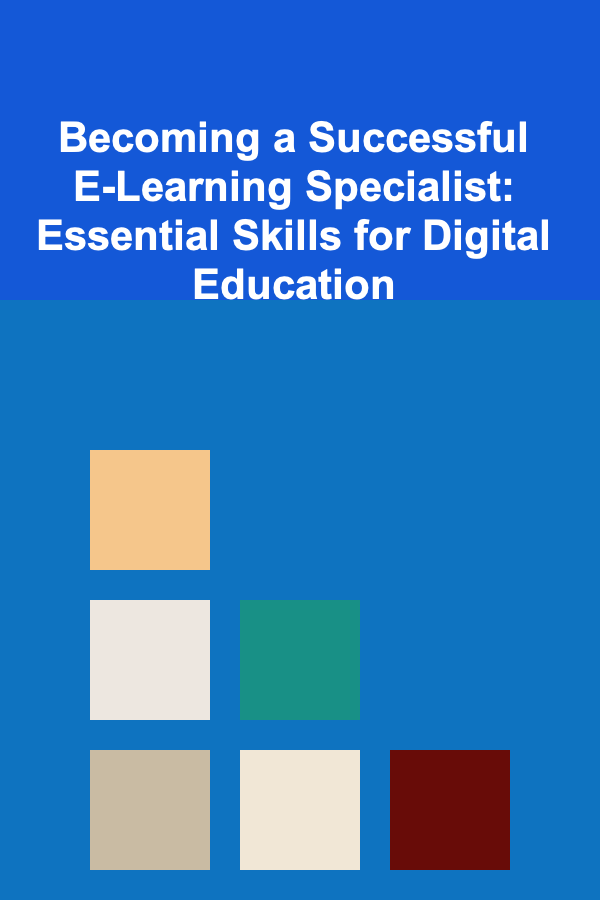
Becoming a Successful E-Learning Specialist: Essential Skills for Digital Education
ebook include PDF & Audio bundle (Micro Guide)
$12.99$8.99
Limited Time Offer! Order within the next:

The rapid growth of online education has created an increasing demand for skilled e-learning specialists. With the rise of digital platforms, educational institutions, corporations, and individuals alike are seeking effective ways to deliver engaging and impactful online learning experiences. Whether you are just starting your career or looking to refine your skills, becoming a successful e-learning specialist requires a unique blend of technical, pedagogical, and interpersonal expertise.
This guide will explore the essential skills and strategies that will help you thrive in the ever-evolving world of digital education.
Understanding the E-Learning Landscape
Before diving into the specific skills required to succeed as an e-learning specialist, it's important to understand the broader context in which this field operates. E-learning, or online learning, refers to the delivery of education via digital resources, including videos, quizzes, simulations, and interactive content. The field is diverse, ranging from corporate training programs to K-12 education, higher education, and even informal learning platforms like MOOCs (Massive Open Online Courses).
In this fast-evolving landscape, e-learning specialists must stay updated with the latest trends, technologies, and instructional methodologies. It's also essential to recognize that e-learning is not just about transferring content from the classroom to an online setting. The challenge lies in creating engaging, interactive, and effective learning experiences that cater to diverse learners with varying needs.
Core Skills for E-Learning Specialists
2.1. Instructional Design
At the heart of effective e-learning is sound instructional design. Instructional design is the process of creating learning experiences that ensure knowledge transfer and skill development. As an e-learning specialist, understanding instructional design models and methodologies is crucial.
- ADDIE Model: The ADDIE (Analyze, Design, Develop, Implement, Evaluate) model is a widely used framework for instructional design. It helps in systematically approaching the design process and ensures that each stage is thoughtfully executed.
- Bloom's Taxonomy: Understanding Bloom's Taxonomy is essential for developing learning objectives that guide the development of assessments, activities, and instructional content. Bloom's Taxonomy categorizes cognitive skills from simple to complex, allowing you to design a progressive learning experience.
- Learner-Centered Design: Successful e-learning prioritizes the needs, preferences, and learning styles of the audience. Designing personalized and engaging content for diverse learners, whether they are visual, auditory, or kinesthetic, enhances their experience and retention.
2.2. Technological Proficiency
A successful e-learning specialist must be proficient with a wide range of technology tools and platforms. From authoring tools to Learning Management Systems (LMS), the ability to navigate these tools is essential for creating and managing e-learning content.
- Learning Management Systems (LMS): LMS platforms such as Moodle, Blackboard, or Canvas allow you to upload, manage, and track the progress of learners. Familiarity with the functionalities of these systems is crucial for monitoring learner performance and delivering content effectively.
- E-Learning Authoring Tools: Tools like Articulate Storyline, Adobe Captivate, and Camtasia are used to create interactive and multimedia-rich content. Being able to use these tools to design engaging modules and simulations will set you apart as an e-learning specialist.
- Video and Multimedia Editing: Since video is a dominant form of content in online education, basic knowledge of video production and editing tools is valuable. Learning how to create high-quality videos, animations, and graphics will enhance the interactivity of your content.
2.3. Pedagogical Knowledge
While technological skills are important, pedagogical knowledge is equally essential for creating effective online learning experiences. Understanding how people learn online is critical for ensuring that your content resonates with your audience.
- Constructivist Learning: Constructivist learning theory emphasizes the active role of learners in constructing their own knowledge. As an e-learning specialist, designing activities that encourage problem-solving, collaboration, and critical thinking can greatly enhance engagement and retention.
- Scaffolding: This pedagogical approach involves providing support at the beginning of the learning process and gradually reducing it as learners gain confidence and expertise. Scaffolding techniques can be applied through tutorials, guided exercises, or interactive assessments.
- Bloom's Digital Taxonomy: With the increasing integration of digital tools, understanding how Bloom's Taxonomy adapts in the digital age is key. E-learning specialists should incorporate tools that enable learners to collaborate, create, and analyze content rather than just consume it.
2.4. Project Management Skills
As an e-learning specialist, you'll often manage projects that involve multiple stakeholders, tight deadlines, and complex requirements. Project management skills are essential for ensuring that projects run smoothly, on time, and within budget.
- Time Management: E-learning projects can be time-intensive, especially when you are developing detailed, interactive courses. The ability to prioritize tasks, create realistic timelines, and meet deadlines is essential to avoid project delays.
- Collaboration: Many e-learning projects require input from subject matter experts, graphic designers, video producers, and others. Strong collaboration and communication skills will ensure that the project is cohesive and that everyone involved is aligned with the learning goals.
- Risk Management: Being able to anticipate challenges and risks in an e-learning project, such as technical difficulties, content delays, or learner engagement issues, will allow you to take proactive measures to mitigate these risks.
2.5. Data Analysis and Evaluation
E-learning specialists must assess the effectiveness of their courses, both in terms of learner performance and overall program impact. Data analysis and evaluation are essential components of this process.
- Learning Analytics: Learning analytics involves collecting data on how learners engage with content, track their progress, and identify areas where they may be struggling. Analyzing this data allows you to make improvements in course design and content delivery.
- Feedback Loops: Incorporating feedback from learners and stakeholders is crucial for refining your courses. Surveys, quizzes, and open-ended questions can help you gather insights that inform future revisions.
- Assessment Design: A strong e-learning specialist understands how to design effective formative and summative assessments. Whether it's quizzes, peer reviews, or final projects, assessments are key to evaluating learning outcomes and providing feedback.
2.6. Communication and Interpersonal Skills
While technical and pedagogical knowledge is critical, your ability to communicate effectively with various stakeholders---including learners, clients, and team members---is just as important.
- Clear Instructions: Online learners may be working independently, so providing clear, concise instructions for assignments, assessments, and activities is essential to avoid confusion.
- Support and Engagement: Engaging with learners through discussion forums, live sessions, or one-on-one communication helps foster a sense of community and ensures that learners feel supported throughout their learning journey.
- Stakeholder Communication: Whether working with an educational institution or a corporation, communication with key stakeholders will help ensure that their expectations are met and that learning objectives are aligned with organizational goals.
Building a Career as an E-Learning Specialist
Now that you understand the essential skills required to be a successful e-learning specialist, it's important to take steps to build your career. Here are some actionable strategies for professional growth:
3.1. Continual Learning
The field of e-learning is constantly evolving with new tools, technologies, and best practices. To stay competitive, you should commit to lifelong learning.
- Certifications: Consider earning certifications from recognized bodies such as the International Association for Educational Technology (IAET) or the Association for Talent Development (ATD). These certifications demonstrate your expertise and commitment to staying current in the field.
- Online Courses: There are numerous online courses available that focus on instructional design, e-learning tools, and learning analytics. Platforms like Coursera, edX, and LinkedIn Learning offer specialized courses to help you expand your skill set.
3.2. Networking and Collaboration
Building relationships with other professionals in the e-learning field can help you gain insights, share knowledge, and even secure new job opportunities.
- Professional Communities: Join online forums, social media groups, or professional associations dedicated to e-learning. These communities can be invaluable for sharing ideas and staying updated on industry trends.
- Conferences and Webinars: Attend industry conferences, webinars, or workshops to network with other e-learning specialists and stay informed about the latest developments in the field.
3.3. Building a Portfolio
A strong portfolio is essential for showcasing your skills and expertise to potential employers or clients. Include examples of your instructional design work, e-learning modules you've developed, and any measurable outcomes from previous projects.
- Case Studies: Highlight specific projects where you've successfully applied your skills, along with the results. If possible, include data on learner engagement, completion rates, or performance improvement.
- Personal Website: Create a personal website that showcases your portfolio, offers information about your services, and provides a platform for potential clients or employers to contact you.
Conclusion
Becoming a successful e-learning specialist requires a blend of technical proficiency, pedagogical knowledge, and strong interpersonal skills. The demand for online education will continue to grow, offering many opportunities for professionals who are committed to mastering the necessary skills and staying ahead of industry trends. By focusing on instructional design, mastering e-learning technologies, and building a solid professional network, you can position yourself for long-term success in the digital education landscape.

How to Approach Home Renovations and Remodeling for Maximum Value
Read More
How to Brew Nordic-Style Coffee
Read More
How to Clean Your Home Using a Minimalist Approach
Read More
How to Start Utilizing Online Marketplaces for Selling Unused Items
Read More
How to Teach Kids About Nature with Family Hiking Trips
Read More
Mastering Research Analysis: A Comprehensive Guide for Aspiring Analysts
Read MoreOther Products

How to Approach Home Renovations and Remodeling for Maximum Value
Read More
How to Brew Nordic-Style Coffee
Read More
How to Clean Your Home Using a Minimalist Approach
Read More
How to Start Utilizing Online Marketplaces for Selling Unused Items
Read More
How to Teach Kids About Nature with Family Hiking Trips
Read More